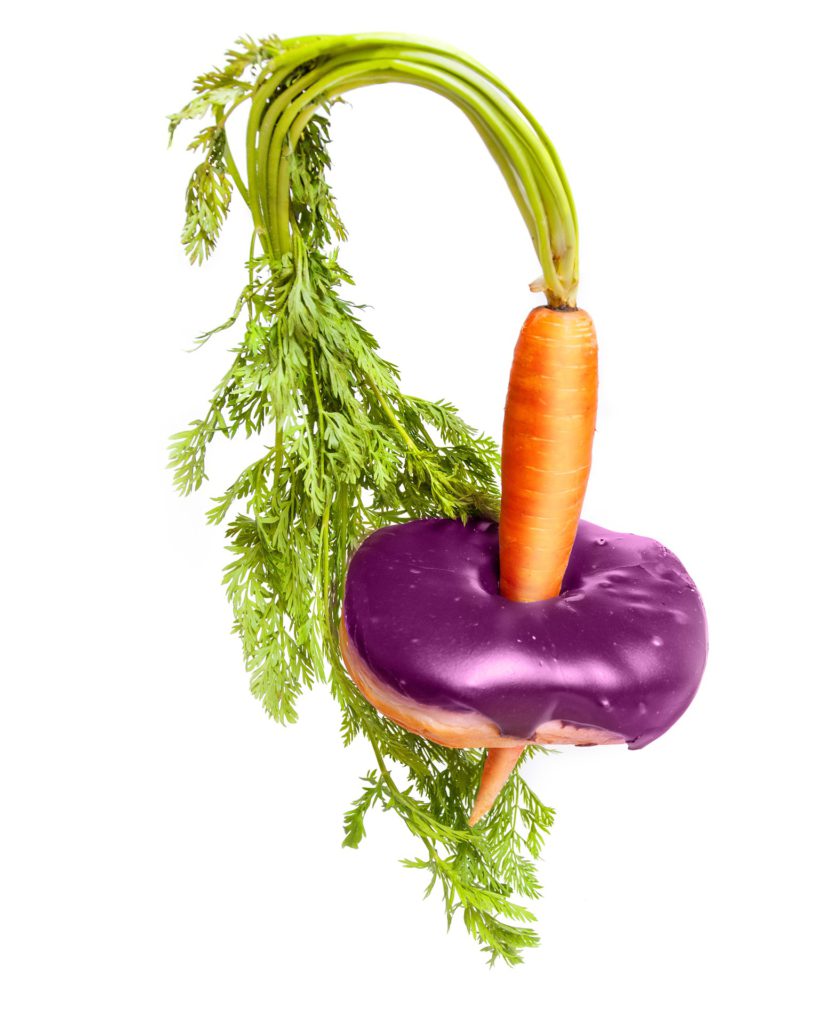I spent many years having an unhealthy relationship with food and exercise. I put myself in a vicious cycle of making poor food choices and then beating myself up on a treadmill later. Exercising was only a means to justify my eating. And from a health standpoint, I really only cared about my weight.
Over the last few years, I’ve been educating myself on how diet and exercise affect my body on ALL levels, not just the number on a scale. Most of my food choices are healthy ones because I know that’s what my body needs, but that doesn’t take away the cravings for my favorite desserts and snacks. It’s taken a while, but I feel I’m finally at a place where I can enjoy things in moderation without feeling guilt or shame. My goal with this article is to help YOU get to a place where you can also stop shaming yourself for enjoying foods that you love. I’m not advocating that we ditch all health efforts and go back to eating nothing but pizza and Pop-Tarts. I’m saying you can get to a place of healthfulness without completely denying yourself your treats. So where do we start?

Guilt and stress do more damage to your body than a donut ever will.
Food Is Not a Moral Choice
First, let’s stop putting morality on food! Stop using terms like “cheat days.” Who are you cheating on? That very notion makes it sound like you’ve misbehaved for simply enjoying food. Of course, some foods do detrimental things to our health and those foods should be consumed infrequently. But if you are primarily making healthy choices, the occasional dip into those “bad” foods may just ward off a binge eating session (discussed later.) Listen to your cravings and decide how to give in without doing damage to your overall health.
Let’s Cancel Diet Culture
It’s hard to turn on the news these days without hearing something about cancel culture. The only thing I’m interested in canceling is diet culture! In my last article, I mentioned that the diet industry was recently valued at over $192 billion dollars. Since 95% of diets fail before they even get started, this value will just continue to grow as crazy diets are rebranded and presented to the public as “the next sure thing.” Diet culture not only encourages restrictive eating but also pushes the idea of being thin at the cost of health and wellness. I am not suggesting that we shouldn’t all strive to be a healthy weight for our bodies. Instead, I’m suggesting that we focus more on our overall wellbeing instead of feeling unworthy because we aren’t a size 2.
Stop Labeling Food As “Good” or “Bad”
Remember the glory days (probably when you were a kid) when you just ate when you were hungry? Enjoyed dessert without guilt? Instinctively stopped eating when you were full? At some point, we started looking at food as either “good” or “bad” and then judging our behavior for eating those foods. We feel shame for indulging in something we decided is “bad”. And on the topic of bad foods, boy has that changed over the decades! In the 80’s we over-indulged in foods labeled “fat-free” with no regard to the amount of sugar or chemicals it took to make that food tasty. Who remembers Olene? Yikes. The very foods I ate in the ’80s when I thought I was being “good” are foods I now tend to avoid because of the health implications.
Food Morality Leads to Binge Eating
I’m guessing we’ve all experienced episodes of binge eating. The severity of binge eating is vast and some people really struggle with this on a deep level. My heart goes out to those dealing with this because I know how challenging this affliction can be. For most of us, we experience binge eating on a smaller scale. Binge episodes might be moments you simply feel out of control. You start grazing. You graze some more. You eat something sweet followed by something salty. Now you want something sweet again. Have you noticed that the foods you tend to binge on are the ones you declared are “bad?” These are the foods you put on a forbidden list. Just by labeling them “bad” or “forbidden”, you made that food seem irresistible. A highly restrictive diet puts so much focus on what you can’t eat, you feel deprived. Deprivation usually leads to binge eating.
So What Now?
None of what you just read suggests that changing your attitude toward food is easy. I am still working on my food issues and learning how to love food while still leading a healthy lifestyle. My hope is that you can also learn to enjoy food without shame. Love yourself. Love your body! It’s the only one you’ll get.




Good article.
Great post.